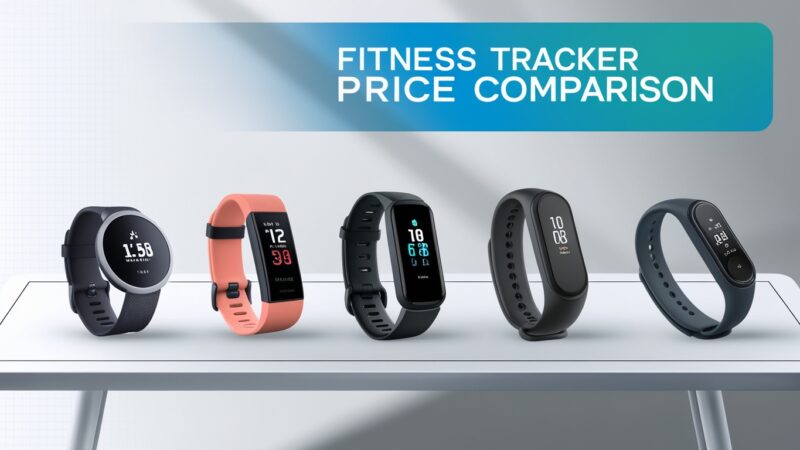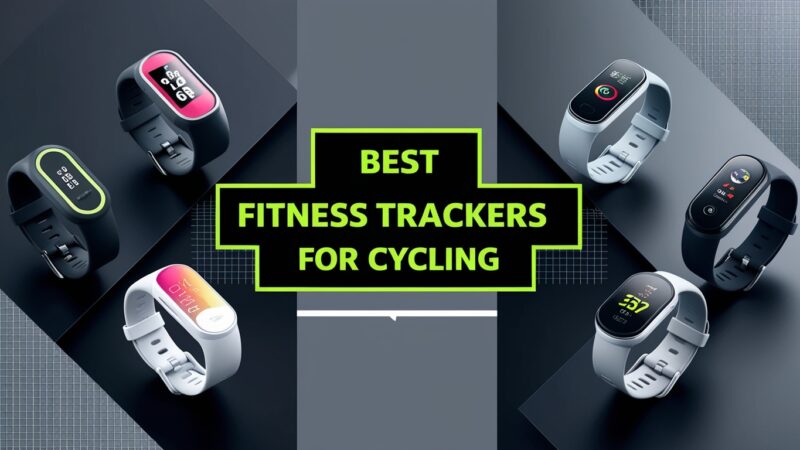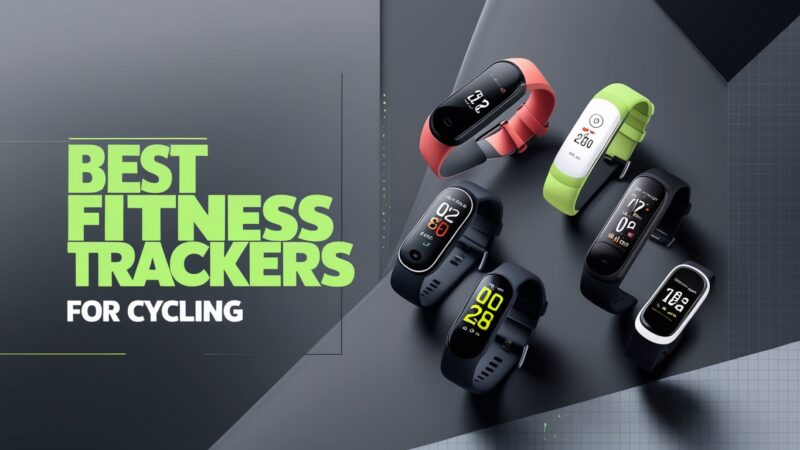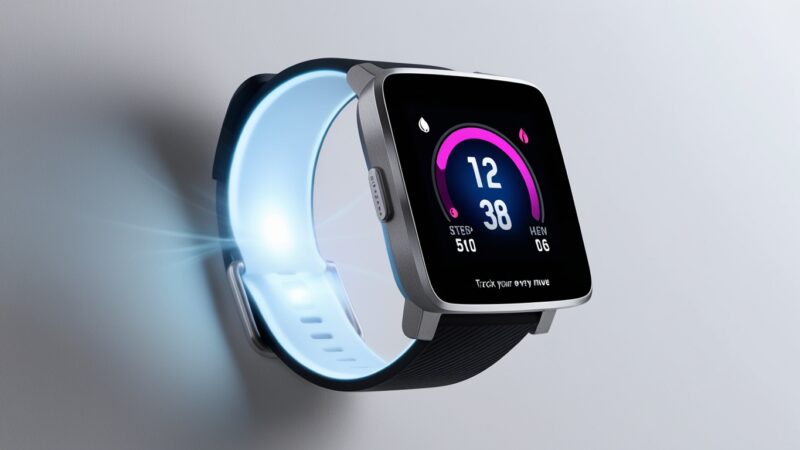Top Fitness Tracker for Accurate Sleep Tracking 2023

Fitness Trackers for Optimal Sleep Monitoring
The Importance of Fitness Trackers for Optimal Sleep Monitoring
Life’s a whirlwind these days, right? With the pressure to be productive and perform at our best, sleep often takes a backseat. But let me tell you, prioritising quality sleep is a game-changer for your overall health. That’s where fitness trackers come into the picture. They’re not just for counting steps; they’re invaluable tools for monitoring your sleep.
Tracking Sleep Patterns
These nifty devices can track various metrics, including:
- Steps taken
- Calories burned
- Heart rate
But they’ve stepped it up a notch with advanced sleep tracking features. They utilize sophisticated sensors to record important details like:
- Sleep duration
- Sleep stages (light, deep, and REM)
- Overall sleep quality
Understanding this data gives us a clearer picture of our sleep habits and highlights areas that need improvement. It’s like having a personal sleep coach right on your wrist!
Personalized Sleep Optimization
Another fantastic perk of using a fitness tracker for sleep monitoring is the power of personalisation. Each of us has unique sleep needs. By keeping tabs on your sleep data, a fitness tracker can help you pinpoint things like:
- Your ideal bedtime
- How many hours of sleep you really need for peak performance
- The lifestyle factors affecting your sleep
Improved Overall Health
Quality sleep isn’t just a nice-to-have; it’s fundamental for good health. Consistently skimping on sleep can lead to chronic sleep deprivation, which carries risks like:
- Increased chances of chronic diseases
- Poor cognitive function
- Weakened immune system
With a fitness tracker monitoring your slumber, you can address these sleep issues proactively, enhancing your overall wellness.
Synergistic Benefits
Many fitness trackers do more than track sleep—they offer a full package for health monitoring. They can also keep track of your:
- Physical activity
- Heart rate
- Stress levels
Combining this data gives you a complete view of your health, empowering you to make informed lifestyle choices.
Identifying Sleep Disorders
Fitness trackers can go the extra mile by helping identify potential sleep disorders such as:
- Sleep apnea
- Insomnia
By monitoring your sleep patterns over time, you might uncover irregularities that merit further medical attention. Getting to the root of sleep issues early can lead to effective treatments that enhance your overall sleep quality.
Integrating with Other Technologies
And here’s the kicker: many fitness trackers can also link up with other smart technologies around your home. Imagine having your bedroom lights adjust based on your sleep data! This integration helps optimise your sleep environment, giving you one more tool in your arsenal for better rest.
The journey to optimal health and well-being has made fitness trackers essential for sleep monitoring. These devices give us personal insights into our sleep, enable targeted interventions, and build a bridge with other health technologies—an all-around win for transforming how we approach sleep!
The Role of Technology in Improving Sleep Quality
The Evolution of Sleep Tracking Devices
Technology has truly shaken up how we monitor and enhance our sleep quality. Fitness trackers, paired with dedicated sleep devices, have opened the door to unprecedented insights into our slumber patterns, duration, and overall quality. Trust me, they’re becoming essential in our quest for better health and well-being.
Fitness Trackers: Comprehensive Sleep Monitoring
Once upon a time, fitness trackers were all about tracking steps and exercise. Now they’re fully equipped to track your sleep as well. Thanks to advanced sensors, they can monitor several sleep parameters, analysing data from:
- Movements
- Heart rate variability
- Physiological responses
Dedicated Sleep Monitoring Devices
However, for those who want even deeper insights, dedicated sleep tracking devices are the way to go. These gadgets, whether bedside sensors or intelligent mattress pads, use advanced technologies like:
- Pressure sensors
- Movement detection
- Electromagnetic field monitoring
Integration with Mobile Apps and AI
What’s more, the data these devices collect often syncs seamlessly with mobile apps and AI algorithms. These applications don’t just display data; they provide personalised insights and even automated sleep coaching! Imagine an AI suggesting lifestyle tweaks or bedtime routines tailored just for you!
The Benefits of Improved Sleep Quality
Using technology-driven sleep monitoring devices can lead to numerous benefits for your health.
Enhanced Physical Health
Quality sleep is closely linked to physical health. Good sleep dramatically reduces the risk of chronic conditions like:
- Obesity
- Heart disease
- Diabetes
Improved Mental Health
It’s no secret that sleep affects mental health. Poor sleep can contribute to issues like:
- Depression
- Anxiety
Improving your sleep quality helps enhance cognitive functions, regulate mood, and diminish the symptoms of mental health conditions.
Increased Productivity and Performance
Good sleep is vital for optimal cognitive function, impacting areas such as:
- Memory
- Concentration
- Decision-making
Overcoming Barriers to Improved Sleep
The benefits of quality sleep are clear, but there are challenges to achieving it. Thankfully, technology-driven sleep monitoring devices can help overcome these hurdles.
Identifying Sleep Disorders
Common sleep disorders like apnea or insomnia can disrupt sleep quality. Sleep monitoring devices offer the means to identify such issues, allowing individuals to seek medical intervention and enhance their sleep quality.
Promoting Healthier Sleep Habits
These devices encourage healthier habits by revealing patterns and suggesting lifestyle changes. This may include:
- Adjusting bedtime routines
- Changing sleep environments
- Reducing pre-sleep stress
Ongoing Monitoring and Adjustment
The continuous data from sleep trackers enables continual refinement of sleep habits. This way, you can tweak your strategies until you find the most effective sleep improvement approach.
The role of technology in improving sleep quality is immense. With fitness trackers and sleep monitoring tech at our fingertips, we are empowered with the insights and tools necessary for a well-rested life. Embracing these innovations gives us a fighting chance at optimal health—one restful night at a time!
Unlocking the Power of Data-Driven Sleep Insights
Nowadays, sleep feels like the holy grail of health, doesn’t it? Understanding our sleep patterns has suddenly become critical. Fitness trackers are leading the way, providing heaps of data-driven insights to help us get the best sleep possible.
The Importance of Sleep Tracking
Sleep serves as a cornerstone of our health, yet many of us find it a challenge to hit the recommended 7-9 hours per night. Poor sleep can result in:
- Reduced cognitive function
- Increased risk of chronic health issues
Fitness trackers can help us monitor our sleep, gain insights into our patterns, and make the necessary changes to boost sleep quality.
Tracking Sleep Stages and Quality
Modern fitness trackers come equipped with sensors that assess various aspects of our sleep. They track things like:
- How long it takes to fall asleep
- Your sleep duration
- The stages you cycle through at night
Analyzing Sleep Data
The insights provided by fitness trackers can help us pinpoint what impacts our sleep—be it stress, physical activity, or environmental conditions. With this knowledge, we can make intentional changes conducive to better sleep.
Optimizing Sleep Habits
Using fitness trackers for sleep monitoring empowers us to make informed decisions. By reviewing data, we can identify trends that guide us toward:
- Adjusting bedtimes
- Incorporating relaxation techniques
- Improving the sleep environment
Integrating Sleep Data with Overall Wellness
Fitness trackers often sync sleep data with other health metrics, like physical activity and stress levels. This holistic view can help us connect the dots and take an informed approach to our personal wellness.
Personalized Sleep Recommendations
With advancements in machine learning, some fitness trackers and apps now deliver personalised recommendations. These can include suggestions for:
- Improving sleep hygiene
- Adjusting sleep schedules
- Using specific relaxation techniques
The power of data-driven sleep insights from fitness trackers cannot be undervalued. They enable us to comprehend our sleep habits, pinpoint areas for improvement, and adjust our lifestyle to ensure we achieve the quality sleep we crave.
Personalized Sleep Recommendations with Fitness Trackers
Unlocking the Power of Fitness Trackers for Personalized Sleep Recommendations
With the hustle of modern life, we can’t underestimate the importance of quality sleep. It’s pivotal for our cognitive function, physical performance, and overall emotional state. Yet, with so many factors influencing our sleep, achieving optimal conditions can be tough. But this is where fitness trackers shine—they offer strong personalisation for sleep recommendations.
Leveraging Fitness Tracker Data for Sleep Insights
These devices go beyond just step counting. Fitness trackers now provide extensive data to help understand our sleep patterns, including:
- Sleep duration
- Different sleep stages
- Overall sleep quality
Identifying Sleep Trends and Patterns
With a fitness tracker, you can spot trends in your sleep data. This allows you to understand the influences on your sleep—like exercise habits, stress levels, and environmental factors—and make informed choices to boost your sleep hygiene.
Personalized Sleep Recommendations
Your fitness tracker can provide tailored sleep recommendations that fit your lifestyle. This could involve altering sleep schedules, suggesting lifestyle changes, or directing you towards sleep specialists when necessary.
Improving Sleep Quality with Fitness Trackers
Fitness trackers play a helpful role in enhancing sleep quality by providing:
- Insights into duration and quality of sleep
- Monitoring sleep stages for good balance
- Identifying influential factors
- Personalised recommendations for better sleep hygiene
- Integration with smart home tech to enhance sleep environments
Tracking Sleep with Fitness Trackers: A Holistic Approach
Fitness trackers extend beyond activity tracking; they’re a thorough approach for improving your overall sleep health. Their integration of sleep data with other health metrics enables informed decisions about your lifestyle resulting in better sleep.
With fitness trackers and their personalised sleep recommendations, you have a valuable tool for improving sleep quality and overall health. By leveraging the insights these devices provide, you can pinpoint your sleep patterns and implement changes that lead to better, more restful nights.
Integrating Fitness Trackers into Your Sleep Hygiene Routine
Harnessing the Power of Fitness Trackers for Better Sleep
In our busy lives, maintaining a healthy sleep routine can feel like a daunting task. However, fitness trackers have made it easier to enhance our sleep hygiene. Let’s take a closer look at how these devices can guide us toward better slumber.
Tracking Sleep Phases and Quality
One of the biggest perks of using fitness trackers is their ability to monitor sleep phases. These gadgets collect data on your movements, heart rate, and breathing throughout the night, providing valuable insights into:
- Duration and quality of sleep
- Sleep cycles
Armed with this information, you can tailor your habits to improve your overall sleep.
Identifying Sleep Disruptions
Fitness trackers help uncover what disrupts your sleep. That might include issues like:
- Frequent wake-ups
- Restlessness
- Noise disturbances
Identifying these quirks lets you tackle the root causes and improve sleep hygiene!
Optimizing Sleep Duration and Consistency
Consistency is crucial for great health. Fitness trackers assist you in finding optimal sleep durations and bedtimes tailored to your needs. By chronicling sleep patterns, you can better establish a steady sleep routine.
Promoting Healthy Sleep Habits
Fitness trackers go beyond tracking. They encourage healthier habits through features like:
- Wind-down reminders
- Relaxation technique suggestions
- Gentle wake-up alarms
Integrating these into your routine develops a mindful approach to sleep, resulting in overall wellness.
Integrating Fitness Trackers with Other Health Apps
Fitness trackers shine by syncing with a broader range of health and wellness apps. This integration allows you to track how various factors—like exercise, stress levels, and nutrition—impact your sleep. This holistic vision lets you create a comprehensive strategy for achieving optimal sleep and, in turn, enhancing your overall quality of life.
Considerations and Limitations
While fitness trackers can greatly improve sleep, it’s important to remember they aren’t perfect. Accuracy can vary, so they may not capture the whole picture of your sleep. Getting too wrapped up in data can become unhealthy, detracting from their benefits.
To maximise their effectiveness, strike a balance when using fitness trackers. Supplement the data with methods like sleep logs or healthcare insights for a well-rounded understanding of your sleep needs.
Integrating fitness trackers into your sleep hygiene routine is a powerful way to improve your sleep quality. By leveraging the insights these devices offer, you can proactively enhance your sleep, benefiting your physical and mental well-being. As with anything health-related, it’s essential to approach fitness trackers with a balanced mindset, ensuring they remain a supportive resource on your path to better sleep.
You can now buy my E-Book on Discount for only $4! If you need personal help or a program, you can reach out to me on Instagram!
Latest Advancements in Fitness Trackers for Sleep Monitoring
Fitness trackers for sleep monitoring have evolved remarkably over the past few years. Let’s dive into some of the latest advancements that are making waves in the sleep tracking world.
In-Depth Analytics for Sleep Insights
Today’s fitness trackers provide more detailed analytics than ever before. Here’s what you can expect:
- Sleep debt tracking: Some devices now keep tabs on your sleep debt, helping you monitor how much sleep you owe your body.
- Sleep consistency analysis: They assess how consistent your sleep patterns are, which is crucial for overall health.
- Environmental impacts: Advanced sensors can evaluate room temperature and noise levels, highlighting their impact on your sleep.
These enhancements empower users to make informed decisions that can improve sleep quality. For example, if your tracker indicates that high room temperatures lead to poor sleep quality, you might decide to adjust the thermostat accordingly.
Smart Wake Features
Many modern fitness trackers now incorporate smart wake features that can wake you up during a light sleep cycle, making mornings more manageable. Here are some highlights:
- Vibration alarms: Gentle vibrations can snap you out of deep sleep at the most optimal moment, making you feel more refreshed.
- Smart alarms: These alarms are designed to wake you within a predefined window, ensuring you wake up at the best time based on your sleep stage.
Wearables for Improved Breathing Quality During Sleep
Newer fitness trackers also monitor breathing quality through advanced sensors, which is particularly beneficial for those suffering from sleep disorders:
- Snore detection: Some devices can detect snoring patterns, prompting users to seek dietary or positional changes.
- Oxygen levels monitoring: This feature can help identify drops in oxygen levels that could signify conditions like sleep apnea.
Integration with AI Assistants
Integrating your fitness tracker with AI assistants opens up new possibilities for personalised sleep insights:
- Voice commands: You can use voice commands to check your sleep stats, making it easier to stay updated.
- AI-driven recommendations: Some devices provide instant feedback on habits that may negatively impact your sleep quality.
These integrations can help create a seamless experience where technology not only tracks but also assists in promoting better sleep hygiene.
Community Data Sharing
Some fitness tracker platforms allow users to share anonymised sleep data with a community. This can lead to valuable insights into common sleep struggles:
- Trend analysis: Users can compare their sleep data with others to understand what strategies yield better rest.
- Shared experiences: This can lead to discussions on lifestyle changes that positively affect sleep quality.
Biofeedback Integration
A fascinating development in sleep tracking is biofeedback integration. Here’s what this entails:
- HRV Monitoring: Heart Rate Variability (HRV) is now being tracked, providing information about your stress levels and recovery.
- Breathing techniques: Some trackers can suggest breathing techniques to help lower your heart rate, promoting relaxation before bed.
By recognising stress indicators before bedtime, users can take proactive steps toward relaxation, ensuring improved sleep quality.
Enhancements in Sleep Tracking Apps
Mobile applications connected to fitness trackers have also seen upgrades:
- Interactive sleep diaries: Users can log additional details about their day-to-day activities to correlate them with sleep quality.
- Gamification: Some apps now include features that reward users for consistently hitting sleep goals, making it more engaging.
Linking Emotional Well-being to Sleep Quality
Recent studies illustrate the connection between emotional health and sleep patterns, leading to new features in fitness trackers:
- Mood tracking: Some devices encourage users to track their mood alongside sleep, helping identify emotional factors affecting sleep quality.
- Stress level assessments: By monitoring physiological signs of stress, users can be guided toward relaxation or mindfulness techniques before bed.
Conclusion
In the fast-paced world we live in, tracking our sleep quality is no longer just a luxury but a necessity. Fitness trackers for sleep monitoring have become indispensable tools in this arena, evolving significantly with advanced features that cater to individual needs.
The plethora of functionality—from tracking detailed sleep patterns and identifying disorders to integrating with AI assistants and promoting emotional well-being—demonstrates how these devices can profoundly influence our sleep health.
Incorporating fitness trackers into our daily routines not only aids in understanding our sleep habits but also empowers us to make informed decisions for better rest. The science of sleep has been revolutionised, and with fitness trackers leading the charge, achieving restorative slumber has never been more achievable.
For those interested in boosting their sleep health, embracing these innovative technologies is a step in the right direction. Let’s not underestimate the power of a good night’s sleep!
Sources:
– Sleep Foundation
– Healthline
– Well + Good
– CNET
For more information, explore our website. You can find answers to common questions in our FAQ section, learn more about us on our Home page, discover the range of services we offer in the What We Provide section, get in touch with us through the Contact page, and stay connected with us on our Socials.
You can now buy my E-Book on Discount for only $4! If you need personal help or a program, you can reach out to me on Instagram!






